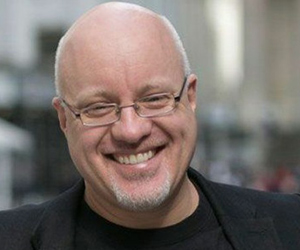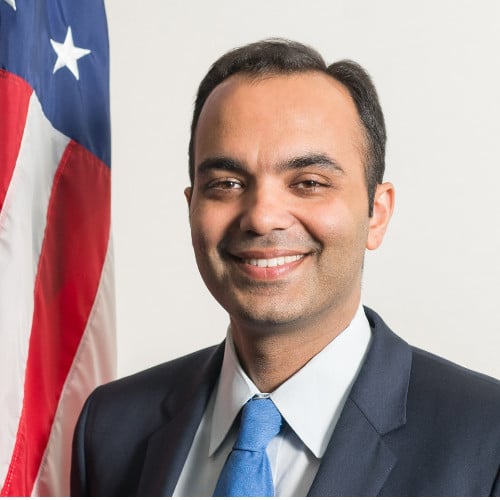Scientist and science fiction writer Isaac Asimov created the Three Laws of Robotics for his stories in 1942, but they relate uncannily to the growing debate over artificial intelligence, especially generative AI.
The laws state:
1. A robot may not injure a human being or, through inaction, allow a human being to come to harm.
2. A robot must obey the orders given to it by human beings, except where such orders would conflict with the First Law.
3. A robot must protect its own existence as long as such protection does not conflict with the First or Second Law.
It’s hard not to have this in mind as society at large grapples with the promise and the peril of AI.
In late July, the Biden administration gathered representatives of seven AI companies — Amazon, Anthropic, Google, Inflection, Meta, Microsoft and OpenAI — to announce that each had voluntarily agreed to help ensure “safe, secure and transparent” development of AI technology.
Among many points agreed to: extensive safety testing of AI before its release and the involvement of third parties to test for vulnerabilities.
This follows a warning in May from leaders in the development of AI technology about the existential threat it poses to humanity.
The Center for AI Safety put out a 22-word open letter to that effect, inviting AI leaders and others to sign. Among the more than 350 executives, researchers and engineers who added their names are the chief executives of OpenAI, Google DeepMind and Anthropic.
But the debate is just beginning.
What follows is an overview of what people from all corners — banking, technology and government — are saying about generative AI.

Why Industry Cloud for Banking?
PwC’s Industry Cloud for Banking helps deliver personalized products and services that today’s customers expect.

Unlocking Digital Acquisition: A Bank’s Journey to Become Digital-First
This webinar will offer a comprehensive roadmap for digital marketing success, from building foundational capabilities and structures and forging strategic partnerships, to assembling the right team.
Read More about Unlocking Digital Acquisition: A Bank’s Journey to Become Digital-First
The Beginning of Something Huge
“Consider how many times you’ve heard the term AI or GPT in the earnings calls just this quarter versus all quarters in history prior. This trend seems to be moving faster than anyone can comprehend or get a handle on. Everyone feels like they are on their back foot and struggling to catch up.”

Jack Dorsey
The Block Head (that’s his title, really)
Block, the parent company of Square
“Today, the question for banks isn’t whether generative AI will profoundly impact their industry, but how. And how will they take advantage of this massive opportunity to capture value?”

Michael Abbott
Global Banking Lead
Accenture
Artificial Intelligence Generates More Questions Than Answers
“Can it be as creative as a human mind? Can it see the art of the possible? Can it understand the creative nuances that emotionally connect with people the way a human can? For me, the jury’s still out.”

Andrea Brimmer
Chief Marketing and Public Relations Officer
Ally
“One of the key drivers of artificial intelligence is that it’s supposed to increase access to capital. And I think that’s a great thing. But the jury is still out as to whether it does that.”

Nicole Elam
President and CEO
National Bankers Association
AI Trouble Spot for Banks: The ‘Explainability’ Factor
“When you enter into deep learning, explainability becomes opaque. And that’s a big challenge for financial services.”

Suresh Ande
Director, Head of Engineering
Bank of America Merrill Lynch
“Like any technology going through very rapid development, AI can be very hazardous. Developed in the wrong way, we see AI being frivolous and, at worst, dangerous. It can be wrong and produce toxic results. It can be infused with extreme bias. It’s not explainable.”

John Duigenan
General Manager Financial Services Industry and Distinguished Engineer
IBM
“You don’t want to have to explain after the fact why an AI model is making certain decisions; it may be too late at that point.”

Alexey Surkov
Risk and Financial Advisory Partner
Deloitte
Want to go deep on AI best practices for banks?
Attend our AI Masterclass — Unlocking the Power of Artificial Intelligence in Banking — at The Financial Brand Forum 2024 on May 20-22 in Las Vegas. Led by Ron Shevlin, chief research officer at Cornerstone, this three-hour workshop will be jam-packed with lessons learned from industry leaders and real-world case studies.
For more information and to register, check out the Forum website.
On Using AI Technology Effectively
“The way to think about it is not as an automation tool. There are some places where it can be used as an automation tool, but really it is about that co-pilot experience. So if you think about flying a plane, if the pilot walks away and the co-pilot crashes the plane, it’s a problem. The pilot’s ultimately still responsible. In this case, we’re seeing these tools as the human is still responsible, the human is still the person doing it, but we want this co-pilot to be able to make them do it faster.”

Charles Morris
Chief Data Scientist for Financial Services
Microsoft
“I think a lot of people think AI is sort of this needle in a haystack thing where there’s a haystack of data and it can go find the needle. But I think AI is much more about, ‘Hey, do I have a problem I need to figure out how to answer, that using patterns and pattern analysis, I can go answer?'”

David Feuer
Chief Product Officer
Galileo
“The most common form of advice our customers will be faced with in the future from financial services is something as simple as this: ‘Hey, Siri. Can I afford to go out for dinner tonight?’ Your bank account should be smart enough to answer that question.”

Brett King
Founder
Moven

Memo to Marketers: Get Comfortable with AI
“The failure to leverage the immense potential of generative AI in your marketing strategy isn’t just an oversight — it’s a regret that AI will be happy to tell you that you made later.”

Kevin Farley
Vice President of Experience and Engagement
United Heritage Credit Union
“Now is not the time to be proud. Pride will be punished by disruption, so if your team can overcome it while your competitors succumb to it (and they will), you will gain market share.”

Lindsey Ogan
Marketing Director
Stride Bank
How Bankers Already Using AI Feel
“It’s hard being held to a higher standard than a human, but it happens.”

Harry Mendell
Artificial Intelligence Consultant and Data Architect
Federal Reserve Bank of New York
Noting that tolerance for any margin of error in work performed with AI is nonexistent
“The benefits of AI for us are about the granularity of the detection process. We can be a lot more targeted about what we are looking for using a machine-learning approach than we can be with rules, which catch a lot of behavior that isn’t of concern.”

Michael Shearer
Managing Director, Group Head of Compliance Product Management
HSBC
On managing financial crime risk

The View from Washington
“There’s no way to put this genie in the bottle. Globally, this is exploding.”

Sen. Cory Booker
New Jersey Democrat
Speaking during a Senate panel on how best to regulate AI
“To reduce costs, many financial institutions are integrating artificial intelligence technologies to steer people toward chatbots. A poorly deployed chatbot can lead to customer frustration, reduced trust, and even violations of the law.”

Rohit Chopra
Director
Consumer Financial Protection Bureau
Consider Yourself Warned
“Mitigating the risk of extinction from AI should be a global priority alongside other societal-scale risks such as pandemics and nuclear war.”
In an open letter signed by hundreds of AI leaders, including Google DeepMind CEO Demis Hassabis and OpenAI CEO Sam Altman







